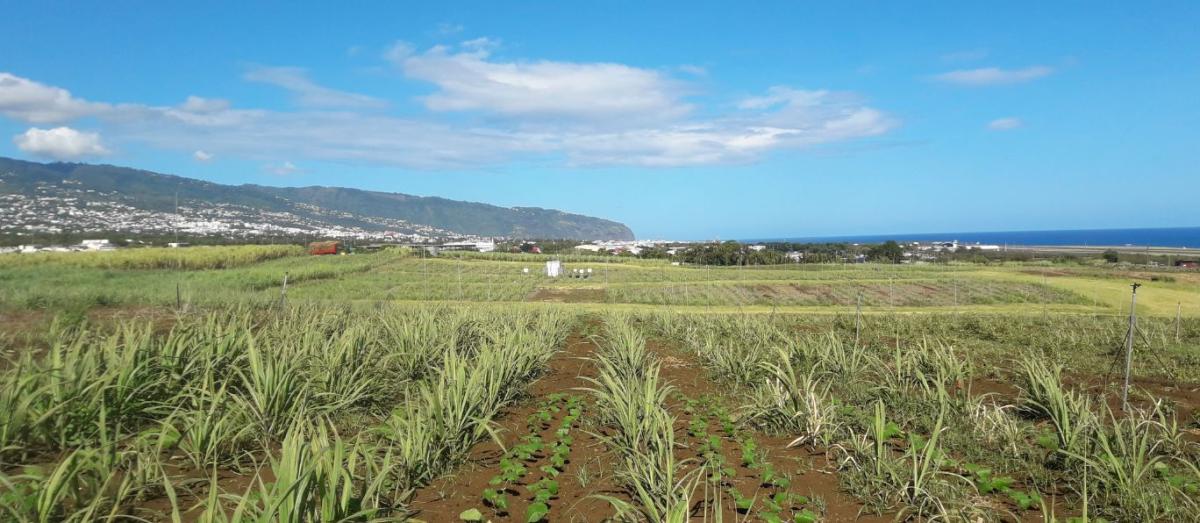- Home
- Worldwide
- CIRAD worldwide
- Projects
- INTERCROPVALUES Project
Developing intercropping for food value chains and ecosystem service provision in Europe and the countries of the global South - INTERCROPVALUES

Rows of sugarcane with two lines of jack beans (Canavalia ensiformis) as a companion plant © Mathias Cristina, CIRAD
Issues
Intercropping is an agroecological crop diversification practice that entails combining different arable crop species within a plot. It is an ancient agricultural system that is still widely used by smallholder farmers in China, India and Africa. It has long been recognised as a means of improving the sustainability of agricultural production in no-input situations. However, despite its advantages, crop diversification in modern agriculture, and especially intercropping practices, are undermined by various technical, organisational and institutional obstacles along the value chains.
The IntercropValuES project is based on the results of the H2020 ReMIX project and those of European partners, and has been extended towards partnerships with countries of the South (CIRAD’s partners).
Description
The project will build on scientific research to better understand and model the functioning of intercropping, and on a detailed analysis of obstacles and levers at the value chain level, to identify credible solutions that could be adopted by the farmers and actors involved along the whole chain, including those working in agricultural product processing.
To this end, this four-year multidisciplinary project will be based on a multi-stakeholder methodology and will bring together scientists and local actors representing the different parts of the food value chain through 13 local case studies.
The IntercropValuES activities are organised around six specific objectives, as follows:
- supporting the design of agri-food chains that are locally relevant, legitimate and innovative, through 13 case studies of co-innovations;
- understanding the functioning of the genotypes of intercropping species their interactions, their management and the soil and climate conditions enabling the selection of compatible ideotypes and the optimisation of farm machinery and management strategies to maximise productivity and ecosystem service provision, in particular with better soil health and greenhouse gas mitigation (through experiments at 15 pre-identified sites);
- producing new knowledge and improved methodologies and tools for the management of intercropping systems and the assessment of their performance and profitability;
- explaining the performance of intercropping systems using models of their functioning and predicting their performance under climate change;
- analysing the technological and sanitary quality of combined crops, especially of seeds resulting from cereal-legume associations, their functional qualities for food processing and the new products proposed;
- identifying the main obstacles, barriers and levers at the value chain level to propose solutions to stimulate their development in Europe, and identifying new market opportunities and solutions to increase the economic value added for farmers.
CIRAD will conduct research in metropolitan France (food processing and agricultural modelling), in Réunion and Mozambique (case studies), and in Senegal and Zimbabwe (genetics, agronomy and soil science).
Expected results
13 case studies in 10 countries.
- Austria: Universitaet Fuer Bodenkultur Wien;
- Belgium: UC Louvain and International Federation of Organic Agriculture Movements European Union regional group Brussels;
- China: China Agricultural University;
- Denmark: Roskilde Universitet, Business Lolland-Falster;
- France: CIRAD, eR-cane (Réunion), INRAE, Institut National des Sciences et Industries du Vivant et de l’Environnement, and Fédération Nationale des CUMA, AgroParisTech (affiliate partner of INRAE), École Nationale Supérieure de Formation de l’Enseignement Agricole (affiliate partner of INRAE);
- Germany: Rheinische Friedrich-Wilhelms-Universitat Bonn, Universität Kassel;
- Greece: Aristotelio Panepistimio Thessalonikis;
- Italy: Consiglio per la Ricerca in Agricoltura e l'analisi dell'economia Agraria, Rete Semi Rurali;
- Mozambique: Universidade Eduardo Mondlane;
- Netherlands: Wageningen University;
- Serbia: Poljoprivredni Fakultet Novi Sad, Univerzitet U Novom Sadu;
- Spain: Iniciativas Innovadoras S.A.L., Instituto Navarro de Tecnologias e Infraestructuras Agroalimentarias Sa;
- Sweden: Sveriges Lantbruksuniversitet;
- Switzerland: Forschungsinstitut Fur Biologischen Landbau Stiftung;























